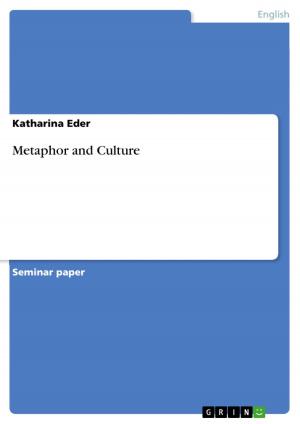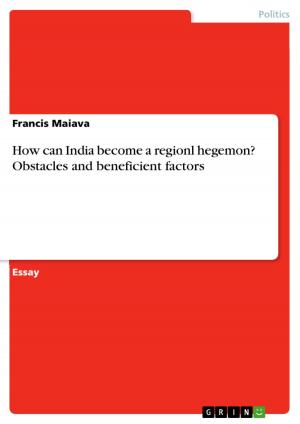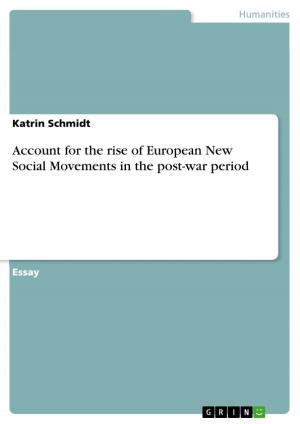The Representation of Imperialism in Rudyard Kipling's 'Plain Tales From the Hills'
Fiction & Literature, Literary Theory & Criticism, British| Author: | Nadja Grebe | ISBN: | 9783640967025 |
| Publisher: | GRIN Publishing | Publication: | July 25, 2011 |
| Imprint: | GRIN Publishing | Language: | English |
| Author: | Nadja Grebe |
| ISBN: | 9783640967025 |
| Publisher: | GRIN Publishing |
| Publication: | July 25, 2011 |
| Imprint: | GRIN Publishing |
| Language: | English |
Seminar paper from the year 2010 in the subject English Language and Literature Studies - Literature, grade: 1,0, Ernst Moritz Arndt University of Greifswald (Institut für Fremdsprachliche Philologien), course: Imagining the Nation: From the British Empire to Multicultural Britain, language: English, abstract: One of the most influential and well-known authors during the time of the British Empire and still today is without doubt Rudyard Kipling. Whether or not his political views can be agreed upon, he nevertheless represents a great part of English literature. He wrote numerous novels, short stories and poems and was even awarded the Nobel Prize for Literature in 1907. (cf. Green 22) Along with this great success, however, came also a spate of criticism leading to an 'ambivalent attitude towards the author and his work' (Gilbert: xvii). Herein lays the prominent reason for writing a paper on colonialism: in the controversial portray of Rudyard Kipling. Some authors like Henry James view him as 'the most complete man of genius [to be] ever known' (159) whilst others see him as a 'jingo imperialist [...] morally insensitive and aesthetically disgusting' (Orwell 74). The majority of Kipling's work has been written during the peak times of the British Empire and takes same one as thematic playground. Kipling is said to have created 'not only the best but almost the only literary picture [of Anglo-India].' (Orwell 82) and thus resemble a suitable foundation for analysis. Hence, it shall be examined what picture of Imperialism with particular reference to Indian colony and its inhabitants as subjects to the Royal government as well as the role of the English in India, is created in Rudyard Kipling's work. Is it really as Fabian Schefold proposes, that Kipling's writing is furnished with racist and imperialist ideas, presenting Britain as racial superior to India? (cf. 59-60) Or is it as Edgar Mertner suggests, that Kipling was rather critic of the British rule in India considering it 'a huge macabre joke' (145).
Seminar paper from the year 2010 in the subject English Language and Literature Studies - Literature, grade: 1,0, Ernst Moritz Arndt University of Greifswald (Institut für Fremdsprachliche Philologien), course: Imagining the Nation: From the British Empire to Multicultural Britain, language: English, abstract: One of the most influential and well-known authors during the time of the British Empire and still today is without doubt Rudyard Kipling. Whether or not his political views can be agreed upon, he nevertheless represents a great part of English literature. He wrote numerous novels, short stories and poems and was even awarded the Nobel Prize for Literature in 1907. (cf. Green 22) Along with this great success, however, came also a spate of criticism leading to an 'ambivalent attitude towards the author and his work' (Gilbert: xvii). Herein lays the prominent reason for writing a paper on colonialism: in the controversial portray of Rudyard Kipling. Some authors like Henry James view him as 'the most complete man of genius [to be] ever known' (159) whilst others see him as a 'jingo imperialist [...] morally insensitive and aesthetically disgusting' (Orwell 74). The majority of Kipling's work has been written during the peak times of the British Empire and takes same one as thematic playground. Kipling is said to have created 'not only the best but almost the only literary picture [of Anglo-India].' (Orwell 82) and thus resemble a suitable foundation for analysis. Hence, it shall be examined what picture of Imperialism with particular reference to Indian colony and its inhabitants as subjects to the Royal government as well as the role of the English in India, is created in Rudyard Kipling's work. Is it really as Fabian Schefold proposes, that Kipling's writing is furnished with racist and imperialist ideas, presenting Britain as racial superior to India? (cf. 59-60) Or is it as Edgar Mertner suggests, that Kipling was rather critic of the British rule in India considering it 'a huge macabre joke' (145).















